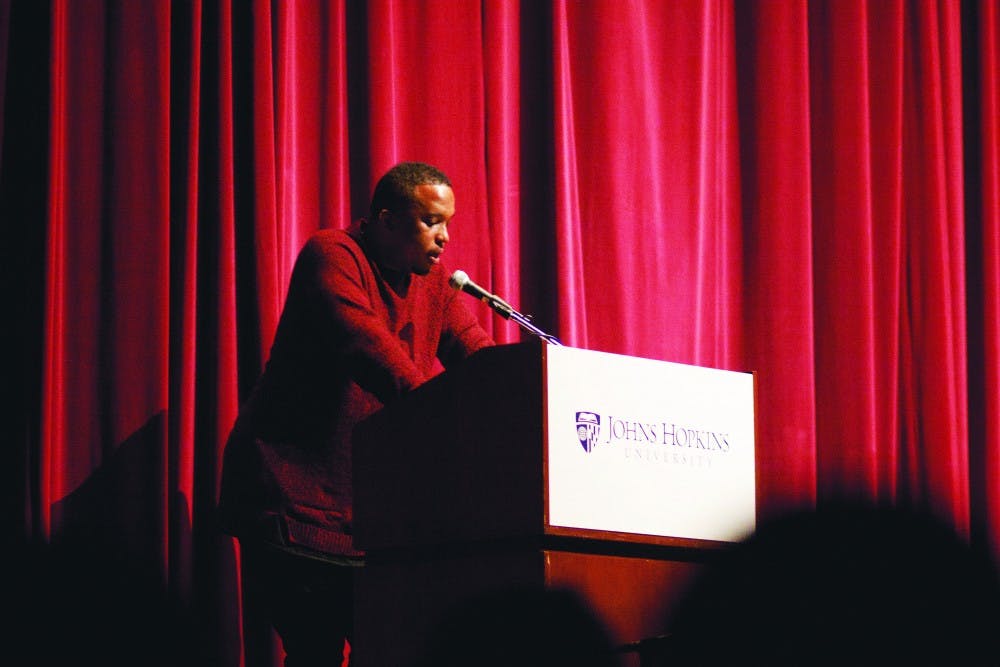By SHERRY SIMKOVIC For The News-Letter
The Milton S. Eisenhower Symposium (MSE) hosted writer Dwight “D.” Watkins, an alumnus of Hopkins and a Baltimore native, on Wednesday in Shriver Hall. His talk, entitled “Baltimore Uprising: The People’s Perspective,” centered around the unrest that erupted last spring following the death of Freddie Gray.
“Tonight we’re going to talk about the uprising, the day our city blew up,” Watkins said. “Everyone developed our own narratives, our own ways to document what happened. I want to talk about your role, my role and the role of any person who really wants to make a difference.”
Watkins talked about the death of Freddie Gray and the subsequent reactions of the Baltimore community. He also spoke about other instances of alleged police brutality across the country such as the death of Michael Brown, the unarmed black teen, at the hand of a police officer in Ferguson, Mo. in 2014, that many people view as a racially fueled.
Watkins thinks that newspapers should print the daily death counts. He cited a particular statistic from The Guardian, stating that the police kill twice as many African Americans as Caucasians.
Watkins spoke about his motivations for becoming a writer.
“I write stories to insert that backstory. I write stories because the people that die were someone’s son, were someone’s student,” Watkins said. “These were real people. But we’re so desensitized that we see something and we forget about it. We always miss the elements of humanity. I try to remind people of their own humanity as well as that of those who died.”
Watkins also explained the problem of gentrification of East Baltimore neighborhoods. While he is not against the idea of new development, he thinks the corporations coming into Baltimore without knowing anything about it are destroying African American neighborhoods.
“The developers say they’re trying to fix Baltimore. They say things like, ‘You have no idea what a gem this city is,’” Watkins said. “I say my city is gone.”
According to Watkins, developers attempting to gentrify the city actually end up displacing people. He believes that if the developers were to understand the black culture in Baltimore, they’d be forced to look at the city differently.
He read an excerpt from his book of essays The Beast Side, in which he met with a pair of developers in an upscale restaurant in Baltimore. The essay highlights differences in culture between Watkins and the developers, who knew very little about the black Baltimore community.
“Through my writing, I hope to elucidate issues of inequality to everyone. I try to write in a way that is accessible to everyone,” Watkins said. “I touch complex issues and offer solutions but never complete solutions. I hope to start the conversation.”
He explained that part of his mission in writing is to compose content to which readers can relate.
“Part of what I hope to accomplish with my writing is to write a love story to all those people out there who are facing a variety of issues, from disparities within health care to financial struggles,” Watkins said. “Growing up in East Baltimore, reading literature in school, you never see yourself in any of the stories. I hope to give the people of black Baltimore a chance to see themselves in my stories.”
Watkins hopes people will be inspired to use their skills and talents to benefit their communities in the face of unrest.
“When you think about the uprising, think about what skills you have and then go out and share that with the community,” Watkins said. “If you’re a writer, teach people how to write. If you’re an artist, teach people how to paint. Inspire someone else to figure out what they can do.”
After his lecture, Watkins opened up the floor to questions.
One student asked how he could get involved in the community when the University recommends not going into surrounding neighborhoods at night.
“Take a stand. If you have something that can clearly help someone, do it,” Watkins said. “If you have the skills, then you’re responsible for doing something about it.”
Another student asked for Watkins’s opinion on the privilege of social media. According to the student, some people say that the information coming from outlets such as Twitter and Facebook does not necessarily come from communities that are directly affected by events such as the Baltimore Uprising.
“Several neighborhoods destroyed in the uprising were too poor to engage in social media. But there’s no one group or one way to be effective,” he said. “Everyone should have the luxury of social media but not everyone does. This gap is narrowing, and using social media can be extremely effective.”
Another student asked Watkins what he thought of the way in which the University handled several abrasive comments on Yik Yak, a social media outlet that allows users to leave anonymous comments. The student said Hopkins did not respond initially and that its actions thereafter were passive at best.
“This should be a safe place for everyone. Brown and black leaders should stand up to everyone,” Watkins said. “You deserve to be heard. You might have to demand it at times, but you deserve to be heard.”
Another student asked if someone, who is not black, should feel comfortable participating in peaceful protests.
“This isn’t just a black issue. We need everyone to care about this issue,” Watkins said. “Take your skills and go into these communities. There are many forms and faces of activism.”





